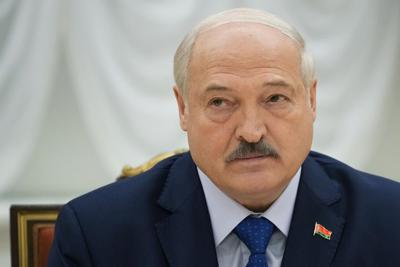TALLINN, Estonia (AP) — Belarusian authorities on Monday said they will not invite observers from the Organization for Security and Cooperation in Europe to monitor the country's parliamentary and local elections, scheduled for Feb. 25.
The move is the latest authoritarian President Alexander Lukashenko has undertaken in recent years to further cement his control over the country's political institutions.
Belarus “has informed the OSCE about its intention not to invite observers and offered its arguments and motivation,” said Andrei Dapkiunas, Belarus' permanent representative to international organizations in Vienna.
Belarus is a member of the OSCE, and members of its Office for Democratic Institutions and Human Rights have been the only international observers at Belarusian elections for decades.
The parliamentary vote on Feb. 25 will be the first election since the contentious 2020 presidential balloting that gave Lukashenko his sixth term in office and triggered an unprecedented wave of mass protests around the country.
Lukashenko's government responded to the demonstrations with a harsh crackdown, arresting more than 35,000 people. Many of those have been brutally beaten by police and were forced to leave the country.
This year's election will take place amid continued repressions and as some 1,500 political prisoners remain behind bars, including leaders of opposition parties and renowned human rights advocate and 2022 Nobel Peace Prize winner Ales Bialiatski.
Belarusian authorities have also carried out “re-registration” of political parties operating in the country of 9.5 million, granting credentials to only four pro-government parties out of 15 that had operated in the country at the beginning of last year. Opposition politicians are not expected to get on the ballot.
You might be interested in
Ihar Karpenka, the head of Belarus’ Central Election Commission, said that the election will take place “under full control of the authorities and without destructive influences.”
“Belarus holds the election for itself first and foremost,” Karpenka said, adding that Belarusian authorities will invite observers from Russia and Central Asian nations.
Since 1995, all elections and referendums in Belarus have been deemed by the Office for Democratic Institutions and Human Rights of the OSCE as not conforming to the organization's standards and being neither transparent nor fair. Meanwhile, observers from Russia and countries allied with Belarus view all the votes within the country as democratic.
Belarusian opposition leader Sviatlana Tsikhanouskaya, in exile in neighboring Lithuania, urged Belarusians to boycott the February vote, calling it “a farce without international monitoring.”
“Lukashenko's regime did everything to make the change of power through elections impossible in the country,” Tsikhanouskaya said.
Once both the parliamentary vote and local elections are concluded, a new state body will be formed — the All-Belarusian People's Assembly. It will feature 1,200 delegates that will include officials, members of local councils, unions, pro-government activists and others, and will operate in parallel with the parliament, which consists of two chambers: the lower house of 110 lawmakers and the upper house of 64 senators.
The Assembly, created by Lukashenko, has broad powers and can decide on policies, draft legislation, propose constitutional amendments, appoint members of the election commission and judges. According to the law, the president of Belarus automatically becomes a member of the Assembly after stepping down.












